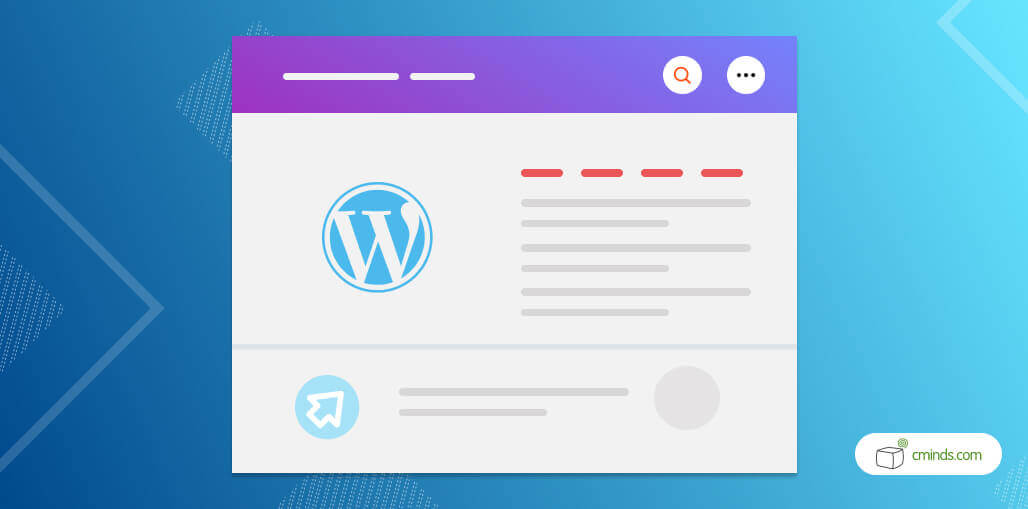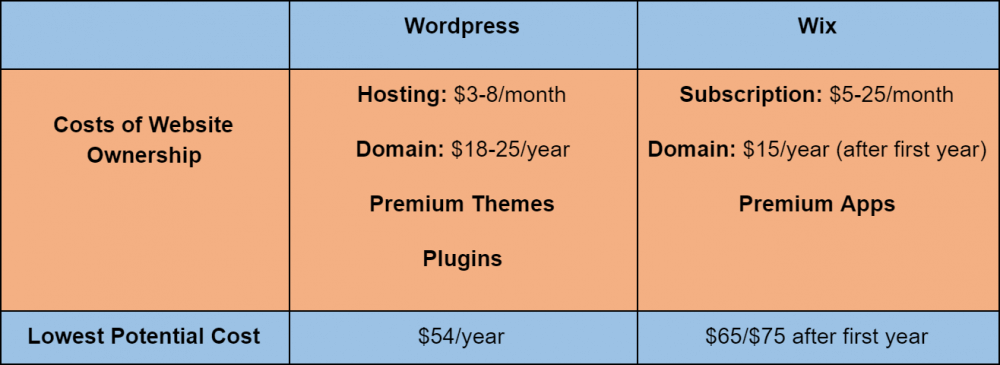Here we’re asking an important question: in the battle of WordPress vs Wix, which comes out on top?

This is a question repeatedly asked by aspiring website owners. The answer ultimately boils down to what you are looking to get out of your website.
If you’ve read the title of this blog, you can probably guess what our preference is. Having said that, Wix does have its benefits. It may be more appealing depending on your experience and website goals.
The benefits include:
- All-in-one website builder
- Beginner friendly drag-and-drop website building
- Dedicated customer support staff
- Hosting and technical maintenance automatically provided
Wix is a great option for those who want an easy way to create a website quickly, without long-term intentions for growth.
However, for those who want to take a more serious approach and don’t mind putting in the work for their website, then WordPress is without a doubt the way to go.
Before we get stuck in, it should be mentioned that there are two versions of WordPress out there, the self-hosted WordPress.org and the hosted-for-you WordPress.com. This article compares Wix specifically to the self-hosted WordPress.org variant. Visit the official WordPress site for an explanation of its two different versions.
December 2024 Offer – For a Limited Time Only:
Get WordPress 99+ Plugins Mega Bundle for 15% off! Don’t miss out!
WordPress vs Wix: Why Choose WordPress?

1. You can host your own website with WordPress
WordPress is a self-hosted platform, meaning you own the entirety of any website you create.
It also means you get to pick a hosting company to get your website running. It also gives you the ability to switch between web hosts at will.
On the other hand, Wix hosts your website for you. So, while you don’t have to search for a hosting company yourself, you’re stuck with what you’re given.
If your website starts running slowly due to poor hosting, or if you want to transfer your website’s data to another domain down the road, you’ll be out of luck.
2. It’s the most widely used CMS on the internet
41% of the internet runs on WordPress. Its popularity means that there are countless resources and online communities dedicated to engaging with and building upon the platform.
So, when you come across a problem with your website, there are dozens of tutorials, guides, and forums where you can seek specific help. With WordPress, you can find fast answers for whatever your issue may be.
3. WordPress offers more flexibility
This one is a biggie.
WordPress is an open source CMS, allowing anyone to access its code to make their own themes and plug-ins. They’re also free to share their creations with the rest of the WordPress community. This gives WordPress users a vast number of tools to create and customize their websites.
Meanwhile, Wix only allows the use of tools and apps created by the Wix development team. The resources are ever growing, but they simply can’t compare to the vast quantity of tools constantly being developed by the WordPress community.
4. Way more options for design
There are thousands of pre-made and user created WordPress themes to choose from. Many are completely free, with many other premium themes available for purchase besides. Even better, any WordPress theme can be modified and adjusted through coding to get the exact look you want.

When building a website with Wix, you will have over 400 website templates to choose from. However, you can’t access the code or make any specific changes to these designs.
5. Your site design can be changed
One of the most restricting aspects of Wix is that once you choose a template, that’s your design for life.
With WordPress you can easily switch between themes. You can switch themes as many times as you want and it won’t seriously affect your content. You may have to make some format adjustments to better fit your newly chosen theme, but WordPress users can freely modify their website’s design.
6. Plug-in support
As mentioned, WordPress allows for the coding and creation of plug-ins. These give its users an incredible number of tools to customize their website.
Wix doesn’t use plug-ins, but offers apps to help manage websites instead. There are hundreds of apps available, but they are exclusively made by the Wix development team. This means less choice available to Wix users.

There are currently over 50,000 WordPress plugins out there.
However, it’s important to note that because of their sheer volume and the fact that anyone can create a plugin, not all are well made or well supported. Care must be taken when decided which to use.
The growing demand for quality plugins has prompted many businesses to erupt in this booming marketplace. Companies like CreativeMinds (hello, that’s us!) offering professionally developed plugins, both free and premium. It’s made finding reliable sources for effective plugins much easier to find.
7. Better SEO management

There’s little benefit to building a website if nobody can find it. Search engine optimization (SEO) is another area where WordPress shines.
WordPress is very SEO friendly, with multiple SEO features built into its core. Of course, you will still need to make sure that you maintain good SEO practices across your website. There are ample plugins available to help optimize your website and improve its search rankings.
In contrast, Wix offers very limited SEO features. You can still add title descriptions to your pages, include alt-text in your images, and generate a sitemap. Aside from that, there isn’t much more you have control over.
When it comes to SEO, WordPress is the clear winner in the battle of WordPress vs Wix.
8. WordPress is best for blogging
While you can create a nice looking blog on either CMS, WordPress was created as a platform for blogging. It’s safe to say that this really shows.
Once you start your website, creating blog posts is intuitive and straightforward. You are able start blogging as easily as you would write in a Word document, and can effortlessly embed different forms of media, like images and videos, directly into your posts.
Managing blog posts is a breeze too, with options to define publication dates for your blogs to be posted, the ability to assigns tags and categories to your posts, and much more.
9. It’s the cost effective choice
A WordPress website will always cost you an ongoing hosting fee, and the initial cost of setting up your domain. After that you’re free to run with your site by using the free themes and plugins available to you, by coding the website on your own, or you can purchase premium themes and plugins to assist you in your website’s creation and management.
If you are tech savvy and want a more hands on experience with building and designing your website, you can save yourself some money and still end up with a professional grade website through WordPress.

Wix does offer a free version of its website builder, but it comes with mandatory advertisements. In addition, you don’t have any control over your domain name.
The premium versions of Wix cost $5 to $25 per month depending on what plan you choose, and while many of its apps are free, they often have limitations unless you upgrade to their premium version.
10. Support for multiple users on one site
When a website is created through Wix, the account which created it is the sole contributor and manager.
With WordPress, you can allow multiple accounts to modify a website, and can even assign different roles for each account. For example, if your website has a blog and you want to hire writers to create content for it, you can give them limited control so they will be able to publish blog pages while restricting their access to the more vital functions of your website.
WordPress vs Wix: The Roundup

Wix has its share of impressive features. It’s well-suited to those who want to build a website but lack technical knowledge.
However, WordPress’ nearly limitless potential for customization and control steals the spotlight for anyone who is serious about creating a successful site.
There will be more work involved when you take the WordPress route, but the rewards are all the greater when you do.


